AN INFANT KING.
 James Charles Stuart was born on June 19, 1566 at Edinburg Castle in Scotland. His father, Lord Darnley, was murdered in early 1567 before young James was 1 year old. His mother, Mary Queen of Scots, subsequently ascended to the Scottish throne. Her reign, however was short lived and she was forced to abdicate in favor of her son on July 24, 1567. Little James was crowned King James VI of Scotland five days later at the tender age of 13 months. Reformation leader John Knox preached the sermon at his coronation.
James Charles Stuart was born on June 19, 1566 at Edinburg Castle in Scotland. His father, Lord Darnley, was murdered in early 1567 before young James was 1 year old. His mother, Mary Queen of Scots, subsequently ascended to the Scottish throne. Her reign, however was short lived and she was forced to abdicate in favor of her son on July 24, 1567. Little James was crowned King James VI of Scotland five days later at the tender age of 13 months. Reformation leader John Knox preached the sermon at his coronation.
James' mother, Mary, was imprisoned in England by her cousin Queen Elizabeth and 19 years later, in February of 1587, was executed for her part in the conspiracy to assassinate Queen Elizabeth. King James never knew his mother.
And so, like many monarchs of the time, King James was reared by neither father nor mother but rather by tutors. Of his four tutors, perhaps one of the most influential was George Buchanan, a staunch Calvinist. It was under Mr. Buchanan's strict teaching methods that King James became one of the most learned and intellectually curious men to ever sit on any throne. Mr. Buchanan was 64 years old when he began tutoring the young king.
It was Greek before breakfast then Latin and history, composition, arithmetic cosmography, dialectics, rhetoric and of course, theology. King James spoke fluent Greek, Latin, French, English, and Scots and was schooled in Italian and Spanish. The King once remarked, that he could speak Latin before he could speak his native Scots. Because of his linguistic capabilities, King James typically did not need a translator when conducting business with other heads of state.
The stiff intellectual diet from George Buchanan was absorbed by a young boy who may have had a certain measure of dislike for his strict tutor. Nevertheless, King James learned well and grew into a powerful man with a powerful pen. The Cambridge University press notes that the King's writings were among the most important and influential British writings of their period.
KING JAMES BEGINS TO REIGN IN SCOTLAND.
King James began to rule his native Scotland when he was 19 years old. A few years later, he took Anne of Denmark to be his queen. King James loved his wife and wrote beautiful poetry for her. Together they had nine children. Once, when the King and Queen were out hunting, Queen Anne accidentally killed the King's favorite hunting dog, Jewell. The Queen felt badly about this and the King bought her a gift to ease her mind of this incident.
 King James believed in the Divine Right of Kings and the monarch's duty to reign according to God's law and the public good. In order to pass on his kingly instruction to his eldest son, Prince Henry, King James wrote Basilicon Doron which means, "the Kingly Gift". Basilicon Doron was not meant for general publication, but for the instruction of the young prince in the likely event that his father would not survive to instruct him--King James was sickly and survived a number of assasination attempts. The King bound his printer Robert Waldegrave to secrecy and ordered an edition of only seven copies. Somehow, however, intelligence of the book and its contents got abroad.
King James believed in the Divine Right of Kings and the monarch's duty to reign according to God's law and the public good. In order to pass on his kingly instruction to his eldest son, Prince Henry, King James wrote Basilicon Doron which means, "the Kingly Gift". Basilicon Doron was not meant for general publication, but for the instruction of the young prince in the likely event that his father would not survive to instruct him--King James was sickly and survived a number of assasination attempts. The King bound his printer Robert Waldegrave to secrecy and ordered an edition of only seven copies. Somehow, however, intelligence of the book and its contents got abroad.
Subsequently, there was so much demand for Basilicon Doron that forged, corrupted copies were being distributed. With these pressures, the King then had it published for the general public and it became a bestseller. It was published in English, Welsh, Latin, French, Swedish and German for a period of over 50 years.
Basilicon Doron is a short treatise, only 153 pages long. It consists of three short volumes, the first of which is "A King's Christian Duetie Towards God." James D'israeli said, "James had formed the most elevated conception of the virtues and duties of a monarch."
In Basilicon Doron, King James' understanding of Christian discipleship, style and prose are at their best. He skillfully intertwines sacred scripture with godly and Christian advice. The King offers his son this important advice on knowing God:
"Diligently read his word, & earnestly...pray for the right understanding thereof. Search the scriptures saith Christ for they will bear testimony of me. The whole Scriptures saith Paul are profitable to teach, to improve, to correct, and to instruct in righteousness, that the man of God may be perfect unto all good works."The whole Scripture contayneth but two things: a command and a prohibition. Obey in both... The worship of God is wholy grounded upon the Scripture, quickened by faith."
Basilicon Doron
THE KING UNITES SCOTLAND AND ENGLAND.
King James' great aspiration to be the first King of both Scotland and England was realized in 1603 upon the death of Queen Elizabeth. When he ascended to the English throne that year he had already been king of Scotland for 36 years. He was now known as King James VI of Scotland & I of England.
The king played a masterly political game and kept his kingdom out of war. For the first time a Scottish monarch wielded effective authority over the more far-flung areas of the realm. He supported literature both through his own writing and his patronage. There was peace during his reign--both with his subjects and foreign powers.
THE KING HAD MANY ENEMIES.
As a Scotsman ruling over the English, the King endured much racism and slander--especially from the once powerful English Lords and Ladies who he replaced with his Scottish countrymen. Unfortunately, many of today's historians look to the writings of hostile sources such as Sir Anthony Weldon and Francis Osborne as accurate descriptions of this great king.
One of the king's detractors, Sir Anthony Weldon, was knighted by King James but was subsequently dismissed after King James found racist writings by Weldon about the King's native Scotland. Many historians today quote Weldon as if he were a reliable historical source. Examples of Weldon's racism are found in his treatise entitled, "A Perfect Description of the People and Country of Scotland" where he says that the Scots are a "stinking people" who hold "fornication...but a pastime". He also said,
"...their flesh naturally abhors cleanness. Their breath commonly stinks of pottage...to be chained in marriage with one of them, were to be tied to a dead carcass, and cast into a stinking ditch....I do wonder that...King James should be born in so stinking a town as Edinburgh in lousy Scotland."
Despite this obvious bias, historians continue to consult the writings of Anthony Weldon who intimated that King James had inordinate affections towards other men--but he did not do this until 25 years after King James was dead and could not defend himself. Today's sodomite/homosexual community is touting the King as one of their own, which he was not. These misinformed sources, virtually without exception, fail to mention that King James and his Queen had nine children together. You can read about the rumors in this article or check out an excellently researched book on the subject by Stephen Coston, Sr. entitled, King James: Unjustly Accused?.
Almost prophetically, the king wrote of his enemies:
"They quarrel me (not for any evil or vice in me) but because I was a king, which they thought the highest evil, and because they were ashamed to profess this quarrel they were busy to look narrowly in all my actions, and I warrant you a moat in my eye, yes a false report was matter enough for them to work upon."--James I, Basilicon Doron
The Catholic religion was also an enemy of King James. Papists (as King James called them) attempted to assassinate him a number of times. Most notably, in 1605 Roman Catholic Guy Fawkes attempted to blow up Parliament when the king was to have been present. The conspiracy was discovered and all co-conspirators were executed. This failed attempt is celebrated on November 5 in England each year and is known as Guy Fawkes Night.
King James was an evangelist of the true gospel, which automatically made him an enemy of Rome. King James strongly delineated the errors of Roman superstition and spurned them yet he treated Romanist subjects fairly. Catholic ambassador Nicolo Molin said this of King James:
"He is a Protestant...the King tries to extend his Protestant religion to the whole island. The King is a bitter enemy of our religion. He frequently speaks of it in terms of contempt. He is all the harsher because of this last conspiracy against his life...He understood that the Jesuits had a hand in it."
SUCCESS IN KINGSHIP.
Despite his detractors, King James the VI of Scotland and I of England was a highly successful King.

As a lover of the theatre, King James became patron to the troop of one of his most famous subjects--William Shakespeare, the playwright. Shakespeare's troop came to be known as the King's Men. Shakespeare and the King held a special relationship as they both loved literature. Shakespeare even wrote his famous play, "Macbeth" specifically for King James.
Another little recognized fact is that King James the VI and I is the founding monarch of the United States. Under his reign, we have the first successful colonies planted on the American mainland--Virginia, Massachusetts, and Nova Scotia (Latin for New Scotland) in SE Canada. The King himself ordered, wrote and authorized the Evangelistic Grant Charter to settle the Colony of Virginia:
"To make habitation...and to deduce a colony of sundry of our people into that part of America, commonly called Virginia...in propagating of Christian religion to such people as yet live in darkness...to bring a settled and quiet government."
CROWNING ACHIEVEMENT.
Not only was King James the first monarch to unite Scotland, England and Ireland into Great Britain (as he liked to call it), but he commissioned what many consider to be the greatest piece of religious and literary work in the world--the Authorized King James Version of the Bible, aka the Authorized Version. King James gave his subjects the greatest gift he could--the Holy Bible so that they could be saved and fed from the Word of God.
In January of 1604, the King called the Hampton Court Conference in order to hear of things "pretended to be amiss" in the church. At this conference, Dr. John Reynolds, a Puritan, requested of the King a new translation of the Bible because those that were allowed during the reigns of Henry the VIII and Edward the VI were corrupt.
The King loved the idea and by July of 1604 the King had appointed 54 men to the translation committee. These men were not only the best linguists and scholars in the kingdom but in the world. Much of their work on the King James Bible formed the basis for our linguistic studies of today.
The translators were organized into six groups and met respectively at Westminster, Cambridge, and Oxford. This group of great scholars had qualifications such as have not been rivaled before or after them. They spent most of their lifetimes in the pursuit of God and knowledge. One translator, Dr. Lancelot Andrews, mastered at least 15 languages and by the time he was 6 years old, he had read the entire Bible in Hebrew. Others on the translation committee were just as qualified. Some wrote foreign language dictionaries and lexicons, they commonly debated in Greek, they translated and edited great works and wrote their own. These are but a few of their fantastic accomplishments. They not only knew the Hebrew, Aramaic, and Greek biblical languages but also the related languages that shed light on them such as Arabic, Persian, Coptic, Syriac, Latin, Chaldee, Spanish, French, Italian, and Dutch.
These men were not only world class scholars, they were Christians who lived holy lives as Deans and Presidents of major universities such as Oxford, Cambridge, and Westminster. Some prayed 5 hours a day.
Their translation work did not go without opposition. According to the translator's notes in the preface of the King James Bible, the Catholic religion was dead set against translating the Bible into the common tongue. Popery proved to be the translator's chief enemy. The translators wrote of the Catholic religion:
"So much are they afraid of the light of the scripture, that they will not trust the people with it...Sure we are that not he that hath the good gold, that is afraid to bring it to the touchstone, but he that hath the counterfeit."
Despite the opposition of the Catholic religion, the work continued and the end product was nothing short of miraculous. Many consider the commissioning of the Authorized King James Version of the Bible the crowning achievement of King James the VI and & I.
Upon its publication, the King James or Authorized Version eclipsed all previous and subsequent versions. It is the best-selling book of all time. Today there are a plethora of Bible versions available--yet for many Christians the King James Bible of 1611 is the absolute and final word of God.
We will use a quote from the Merit Student's Encyclopedia:
"The greatest English Bible is the Authorized, or King James Version...The King James Bible became the traditional Bible of English-speaking Protestants. Its dignified and beautiful style strongly influenced the development of literature in the English language. The influence can be seen in the works of John Bunyan, John Milton, Herman Melville and many other writers."
Actor Charlton Heston had this to say about the King James Bible in his autobiography:
"...the King James translation has been described as the only great work of art ever created by a committee...The authors of several boring translations that have followed over the last fifty years mumble that the KJV is "difficult" filled with long words...Over the past several centuries it's been the single book in most households an enormous force in shaping the development of the English language. Carried around the world by missionaries...Exploring it...was one of the most rewarding creative experiences of my life."The Authorized King James Version of the Bible has been cherished and read by Christians the world over since 1611 when it was published. Sir Winston Churchill said,
"The scholars who produced this masterpiece are mostly unknown and unremembered. But they forged an enduring link, literary and religious, between the English-speaking people of the world."
The Authorized King James Bible is not only heralded by Christians for its doctrinal accuracy, but it has been recognized by the secular as the "Monument of English Prose" for it is most beautiful in style and prose. In fact, the King James Bible has been listed in Norton Anthologies "The World's Best Literature" for decades.
PHYSICAL AILMENTS.
Though King James had a life filled with accomplishments, he was a man acquainted with grief. He was a sickly man who had physical handicaps in his legs and a tongue that was too large for his mouth. As a result of his unsteady gait, the king had numerous falls, accidents and injuries. He suffered from crippling arthritis, abdominal colic, gout, inability to sleep, weak/spasmic limbs, nausea, frequent diarrhea, and kidney pain. Some believe that he may have had congenital diseases of the nervous system. Sometimes the pain was so great that the king became delirious.
To add to his ill-health, the king suffered from depression from the loss of his beloved wife Queen Anne in 1619. She was preceded in death by their eldest son, Prince Henry in 1612. The King was no stranger to pain and sorrow. The sun set on King James the great monarch on March 27, 1625 at Theobolds Park in Herts, England. He was 59 years old when he died and was buried at Westminster Abbey. Unlike many Scottish monarchs, King James died in his bed at peace with his subjects and foreign countries. He also passed Royal power on, intact, to an adult son which was also quite unusual.
Though he died almost 400 years long ago, the King's legacy, the King James Bible continues to flourish and to bring men, women, boys and girls to a life-saving knowledge of Jesus Christ.
Back to His Majestie King James VI & I Page
ecclesiastes viii:iv